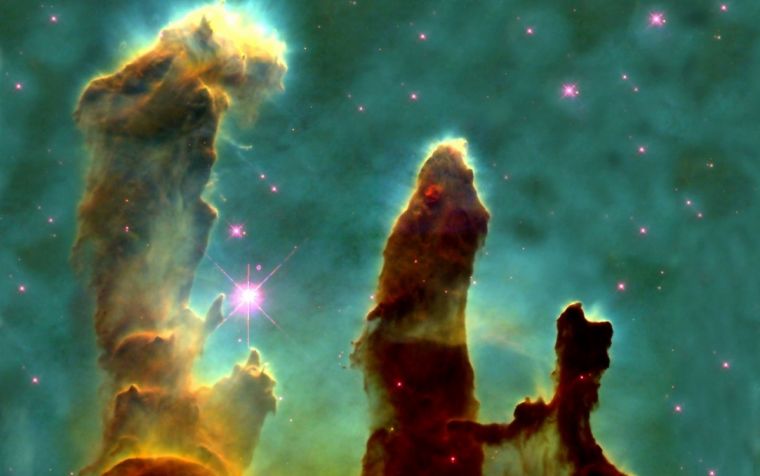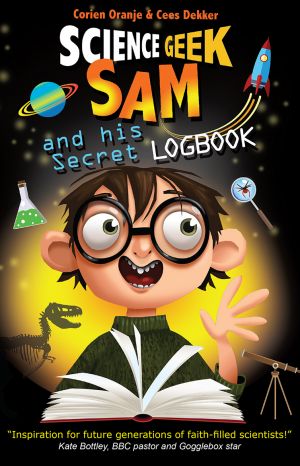Science Geek Sam: Helping children embrace the Bible and the Big Bang
It's September 2015 and I am at a conservative Christian primary school in the Netherlands to introduce my latest book, Science Geek Sam, a novel about Christian faith and science, to the pupils in Year 5 and 6. The kids are very excited and desperate to read the book. They are especially interested in the facts about the universe. When we finish our time together I ask them a question: 'Imagine, a professor visited this school and told you that the universe was created by the Big Bang. What would you say?'
'That he should go away!' a boy shouts.
'That we don't believe him!' a girl says indignantly.

I think back to my own time at primary school and how outraged I felt when my teacher in Year 5 told us that God had maybe used the Big Bang and evolution to create the Earth and mankind. 'Impossible!' I thought, 'Didn't the Bible tell us exactly how everything had been made? God created the Universe, the atmosphere, all the animals and us humans in six days, about 6000 years ago, and that was that.'
For years, I used to reject the theory of evolution. In actual fact, I tried not to think too much about it, out of fear of losing my faith. But after studying theology and reading books by Christian scientists such as Francis Collins, René Fransen and Cees Dekker, I began to see that the evidence for evolution is overwhelming and consistent. The more I read about hermeneutics, the clearer it became that I did not have to choose between Darwin or God, between the theory of evolution or the Bible.
The Bible tells us that God created heaven and earth, but it does not intend to tell us exactly how he did it. Somehow, I had always assumed that I had to interpret Genesis 1-2 literally – in the same way as I would read my newspaper or a history book. But there is a big difference between Jewish literature, which includes some allegory and poetry and was written thousands of years ago, and today's newspapers, giving detailed, factual accounts of wars, crimes etcetera.
I realised that God might have created the Earth and humans in a different way than I had always pictured as a child, but that it did not make his creation act any less miraculous or powerful.
A few years ago I interviewed Professor Cees Dekker for a Christian magazine. Cees Dekker is a prominent Dutch scientist, leader of ground-breaking research in the field of nanobiology. He also is a worship leader in an evangelical church and an accomplished contrabass player. He does a lot of scientific research, including research on evolution, and has discussed and promoted thinking on the relationship between evolution and faith.
During the interview, Cees shared how it saddened him to see so many youth leave the church because they believe that science and faith can't be reconciled. This mainly concerns young people who are torn because they think that the Bible forces them to believe in a six-day creation when, at the same time, they discover the evidence for the big bang and evolution at university.
Cees talked with gusto about the beauty of the universe, about the Big Bang, about how life one earth developed over millions of years – and how he sees God's greatness and love in all of this. For Cees the theory of evolution was not an obstacle to his faith – on the contrary. He told me: 'In the Bible we see that God is the creator and the caretaker of the universe and through scientific discoveries we learn more about how God created everything. All the more reason to glorify God.'
The interview inspired me. 'We should write a book together', I thought, 'a children's novel, in which we describe in a clear and comprehensive way how the universe and the Earth came into being. And a book in which we show that science and faith are not mutually exclusive, that a different, more poetic way of interpreting Genesis 1 and 2 would, actually, do the Bible more justice'. I wanted to write an inspiring book that shows children that it is perfectly fine to believe in God and the Big Bang.
Dekker immediately agreed. 'Let's do it!', he said. And so, we wrote an adventure-filled novel about Year 6 pupil Sam Billington, whose life is turned upside down when a meteorite strikes the school's bicycle shed and causes mayhem and mess. Sam's uncle Jack, an astronomer, comes to the school to investigate the meteorite. A few days later, upon Sam's request, Uncle Jack comes to visit his class to talk about the universe and the Big Bang. This sparks outrage amongst a number of Christian parents, who say there never was such a thing as a Big Bang.
Who is right? The teacher, Mr Nolan, challenges Sam and his classmates to find out for themselves what really happened. They embark on a journey of research and adventure. If God did make everything, indeed, it would be rather cool to figure out how he did it. And so the action-packed story unfolds – it's a journey filled with humour, discussion and adventure, and even a hint of romance...
Over the past 15 years I have written more than 80 books, but no book has ever drawn as much attention as Science Geek Sam. Some reviews, mostly by creationists, were very condemning.
'If only Sam's Secret Logbook had remained secret,' one critic wrote. At the same time, thousands of parents and grandparents responded with great enthusiasm and purchased Science Geek Sam for their child or grandchild, and they also read it themselves, greatly enjoying it. The book sold out twice, so a second and third print run followed. 'How I would have loved to have read this book when I was a child,' well-known Christian tv-presenter Andries Knevel pondered. 'It would have helped me immensely as a student.'

Astronomer Henk Geuverink wrote: 'As a Christian and astronomer, reading this book has sparked great enthusiasm for both the in-depth subject knowledge in the story and the engaging writing style, which works so well for today's youth. With humour the authors successfully tackle a serious topic, that is difficult for many. The arguments in the book are clear, scientifically sound and up-to-date. I recently gave this book to my grandchildren who love it. It's important for them to learn about the topics discussed here and especially to show them that faith and science are not mutually exclusive!'
It is very exciting for us as writers that this book has been translated into the English language. Translators Petra Crofton-van Rijssen and Sophie van Houtryve did an excellent job: they not only translated the book, but also changed the setting to a British one, which hopefully makes it a more familiar and fun read for children in the UK.
We hope that Science Geek Sam will inspire kids and adults alike, and that it will show them a glimpse of God's wonderful creation, his power and love and that it will take away any 'fear of science'. There is a lot more work to do, not least in the Netherlands (the Church of England schools in the UK who have used the book are much more open-minded, I heard). It really would be a great shame if children kept chasing scientists away from their classroom!
'Science Geek Sam and his Secret Logbook' is published in the UK by Lion Hudson, price £8.99.
Corien Oranje is an established children's writer in the Netherlands. Her co-writer, Prof Cees Dekker, is a prominent Dutch scientist, a leader of ground-breaking research in the field of nanobiology and a worship leader in an evangelical church.











